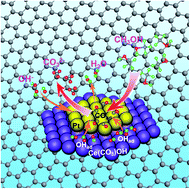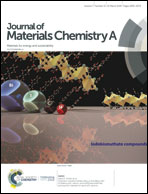Synergistic effects of platinum–cerium carbonate hydroxides–reduced graphene oxide on enhanced durability for methanol electro-oxidation†
Abstract
The durability of electrocatalysts for the methanol oxidation reaction (MOR) is currently the main concern for the commercial application of direct methanol fuel cells (DMFCs). In this work, a hybrid electrocatalytic material consisting of Pt nanoparticles, Ce(CO3)OH nanoparticles and reduced graphene oxide (rGO) has been synthesized through a facile two-step solution method. Compared to Pt/C and Pt/rGO materials, the Pt–Ce(CO3)OH/rGO electrocatalyst exhibits excellent activity and operational durability towards the MOR in alkaline solution. Impressively, an activity of higher than 52% (540 mA mg−1) is retained for the hybrid electrocatalyst after 14 400 s chronoamperometric measurement, and the catalytic activity could be fully reactivated in clean KOH through a few CV cycles. The enhanced properties can be ascribed to the Ce–OH–Pt interface which could effectively promote the oxidation of carbonaceous poisons on Pt sites. Furthermore, Ce3+ in Ce(CO3)OH can also greatly promote the transformation from oxidation state Ptδ+ into metallic state Pt0, favoring the oxidation reaction of methanol on Pt. The synergistic effects provide us a new strategy of structure engineering for highly efficient methanol oxidation.



 Please wait while we load your content...
Please wait while we load your content...